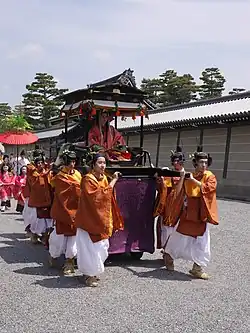こし
Japanese
Etymology 1
| Alternative spelling |
|---|
| 腰 |
From Old Japanese. First appears in the Kojiki of 712 CE.[1] In turn from Proto-Japonic *kəsi.
Pronunciation
- (Tokyo) こし [kòshí] (Heiban – [0])[2][3]
- IPA(key): [ko̞ɕi]
Noun
こし or コシ • (koshi)
- the waist, the (lower) back, the small of the back
- (anatomy) the hip
- Synonym: ヒップ (hippu)
- the skirting of a shoji
- the third line of a waka or tanka poem (from the way that the next two lines are longer, similar to the way the body gets wider at the hips)
- (of food) chewiness; springiness
- コシのある蕎麦
- koshi no aru soba
- springy soba
- コシのある蕎麦
Derived terms
- 腰掛ける (koshikakeru, “to sit down”)
See also
- 胴のくびれ (dō no kubire)
- 腰部 (yōbu)
- 胴回り (dōmawari)
Etymology 2
| Alternative spelling |
|---|
| 輿 |

First cited to The Tale of the Bamboo Cutter in the late-800s, early 900s.[1] Further derivation uncertain. May be the 連用形 (ren'yōkei, “continuative or stem form”) of verb 越す (kosu, “to move something from one place to another”).
Pronunciation
- (Tokyo) こし [kóꜜshì] (Atamadaka – [1])[2][3]
- IPA(key): [ko̞ɕi]
Noun
こし • (koshi)
- palanquin, litter
Etymology 3
| Alternative spelling |
|---|
| 層 |
From Old Japanese. Cited in the Nihon Shoki of 720 CE.[1]
Theorized to be an extension of the hip sense from the way that upper storeys in older Japanese architecture were usually smaller, resulting in a hipped effect similar to the way that the waist may be narrower than the hips on a person's body.[1]
Pronunciation
- IPA(key): [ko̞ɕi]
Noun
こし • (koshi)
- (rare, possibly obsolete, architecture) a storey
Usage notes
This reading has fallen out of use and been replaced by the Middle Chinese-derived sō reading. See the 層 entry for more.
Etymology 4
| Alternative spelling |
|---|
| 濃し |
Adjective
こし • (koshi) †-ku
- classical terminal form of modern adjective 濃い (koi, “thick in consistency; deep in color; rich in flavor”)
Etymology 5
| For pronunciation and definitions of こし – see 古史, 古址, 古祠, 古詩, 虎子, 虎視, 古紙, 枯死, 雇使, 顧思, 顧視. (This term, こし, is an alternative spelling of the above Sino-Japanese terms.) |
(The following entries are uncreated: 古史, 古址, 古祠, 古詩, 虎子, 虎視, 古紙, 枯死, 雇使, 顧思, 顧視.)
References
- 1988, 国語大辞典(新装版) (Kokugo Dai Jiten, Revised Edition) (in Japanese), Tōkyō: Shogakukan
- 2006, 大辞林 (Daijirin), Third Edition (in Japanese), Tōkyō: Sanseidō, →ISBN
- 2011, 新明解国語辞典 (Shin Meikai Kokugo Jiten), Seventh Edition (in Japanese), Tōkyō: Sanseidō, →ISBN